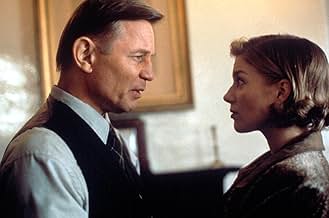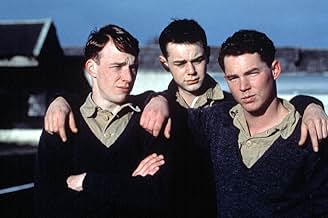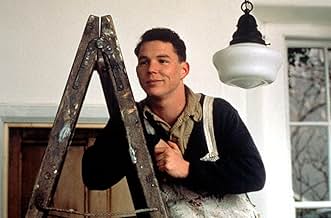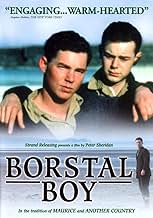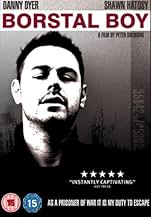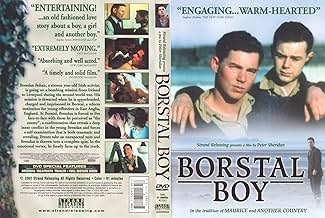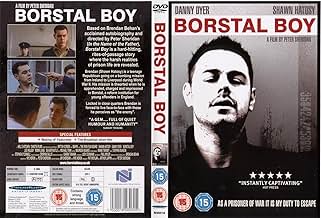NOTE IMDb
6,8/10
2,6 k
MA NOTE
Ajouter une intrigue dans votre langueIrish teenager political activist and future writer Brendan Behan is befriended in a British borstal (reformatory) by a liberal warden.Irish teenager political activist and future writer Brendan Behan is befriended in a British borstal (reformatory) by a liberal warden.Irish teenager political activist and future writer Brendan Behan is befriended in a British borstal (reformatory) by a liberal warden.
- Réalisation
- Scénario
- Casting principal
- Récompenses
- 1 victoire et 4 nominations au total
Avis à la une
I got worried when the film opened with "inspired by" Borstal Boy rather than based on. This is the sort of movie that makes me wish I had a bunch of money so I could run out and start filming "Borstal Boy 2004" and actually film the story and characters that were in the book. The characters were awful and betrayed the rich characterization of the book.
Part of the problem was that the filmmaker looked back to 1942 with a 21st century perspective. For example he wanted to make Brendan sympathetic so Brendan befriended an out homosexual (in 1942) and a jew. Dale, the evil character hated both and was a self-proclaimed rapist. Darth Vader had more dimensions than Dale. I don't know if an IRA soldier from 1942 would look at Hitler, the enemy of his enemy, as being a worthy reason to suspend his fight for independence. Worst of all, Brendan acts like a 14 year old from the American suburbs with his revulsion of homosexuality. The tired message in the movie is that if you are against homosexuality then you, yourself, must be gay. For example, initially revulsed, Brendan ends up falling in love with Charlie. Dale mocks Charlies and later tries to rape Charlie. In the original story, despite being published in the 1950s, Brendan had no such trouble with homosexuals. When he found out Oscar Wilde was gay, he responded non-chalantly that everyone has their own way of doing things. he came across Charlie having sex with another boy and it was no big deal. The play of the same name (1971) did manage to hold true to the original story. This movie should have done the same.
Part of the problem was that the filmmaker looked back to 1942 with a 21st century perspective. For example he wanted to make Brendan sympathetic so Brendan befriended an out homosexual (in 1942) and a jew. Dale, the evil character hated both and was a self-proclaimed rapist. Darth Vader had more dimensions than Dale. I don't know if an IRA soldier from 1942 would look at Hitler, the enemy of his enemy, as being a worthy reason to suspend his fight for independence. Worst of all, Brendan acts like a 14 year old from the American suburbs with his revulsion of homosexuality. The tired message in the movie is that if you are against homosexuality then you, yourself, must be gay. For example, initially revulsed, Brendan ends up falling in love with Charlie. Dale mocks Charlies and later tries to rape Charlie. In the original story, despite being published in the 1950s, Brendan had no such trouble with homosexuals. When he found out Oscar Wilde was gay, he responded non-chalantly that everyone has their own way of doing things. he came across Charlie having sex with another boy and it was no big deal. The play of the same name (1971) did manage to hold true to the original story. This movie should have done the same.
Coming-of-age tale via Irish author Brendan Behan's memoirs about a youthful troublemaker in a British labor camp for lads in 1942. Shawn Hatosy portrays Behan, who shares a bumpy but intense friendship with a gay teenager while timidly romancing a local young lady as well. Curious drama apparently made with the well-intentioned goal to show the burgeoning political activism of a determined man, and how his upbringing molded the figure he was to become; however, too many of these boyhood antics are overly familiar: the playful romping on the beach which precedes a tragedy, the sneaky drinking and smoking during movie-time, the somewhat campy play which brings down the house. The acting by the handsome juveniles isn't bad, though director Peter Sheridan tends to overdose on their aw-shucks smiles and faraway glances. Michael York (despite seeming a bit tired and distanced from the proceedings) is well-cast as the camp's director, but the point of the central relationships is never made clear--the heart of the story has gone missing. Obviously, Behan was not homosexual; although he greatly admired his gay friend, the struggles of this teenager are hardly touched upon--he's treated more like an afterthought in the story rather than an important character--and one aches for more intimacy, more substance. The film has an effectively washed-out look and has interesting locations, but the drama isn't gripping nor enticing because the handling is so aloof. ** from ****
What a surprise of a little movie. Young American actor Shawn Hatosy (he's from Frederick, Maryland) gives an astonishing performance as IRA teen gone wrong, Irish writer Brendan Behan. Hatosy's "angry young man" is sincerely angry, but there are cracks in that tough veneer that show a sensitive, thoughtful kid wanting to break out. (Measure Hatosy's performance from "Outside Providence" to "Borstal Boy" and we're looking at a young actor of exceptional depth and promise.)
At the reformatory Borstal, Brendan discovers new hardships: living, eating and sleeping with his enemies. He learns however, that deep down, our enemies have the same needs, wants, fears and desires as we do ourselves. His budding friendship with the openly gay sailor, Charlie Milwal - despite its rocky beginning, captures the joy and frustration of having a best friend and through this friendship each learns how to understand, forgive and love. As Charlie, Danny Dyer gives a performance which is in every regard as equally deep as Hatosy's.
Brendan's taking to fellow Irishman Oscar Wilde and his eventual barnhouse production of "The Importance of Being Earnest" mounted by the young convicts for their fellow inmates. This is an absolute joy and becomes almost the fulcrum from which the story veers into its final direction.
Michael York, Eva Birthistle and the rest of the ensemble all contribute fine performances (particularly Ms. Birthistle who, as a secondary love interest doesn't arrive until a good half way through the story and is both beautiful and touching).
Director Peter Sheridan crams an almost unbelievable amount of story into into a mere 90 minutes so the film flies by. The ending may be a bit abrupt tying things up too tidily, but this is a minor quibble in a stunning, touching gem of a movie.
At the reformatory Borstal, Brendan discovers new hardships: living, eating and sleeping with his enemies. He learns however, that deep down, our enemies have the same needs, wants, fears and desires as we do ourselves. His budding friendship with the openly gay sailor, Charlie Milwal - despite its rocky beginning, captures the joy and frustration of having a best friend and through this friendship each learns how to understand, forgive and love. As Charlie, Danny Dyer gives a performance which is in every regard as equally deep as Hatosy's.
Brendan's taking to fellow Irishman Oscar Wilde and his eventual barnhouse production of "The Importance of Being Earnest" mounted by the young convicts for their fellow inmates. This is an absolute joy and becomes almost the fulcrum from which the story veers into its final direction.
Michael York, Eva Birthistle and the rest of the ensemble all contribute fine performances (particularly Ms. Birthistle who, as a secondary love interest doesn't arrive until a good half way through the story and is both beautiful and touching).
Director Peter Sheridan crams an almost unbelievable amount of story into into a mere 90 minutes so the film flies by. The ending may be a bit abrupt tying things up too tidily, but this is a minor quibble in a stunning, touching gem of a movie.
10Rhymer
I read the book six times, and couldn't wait to see the movie. I was rather put off at first because so much of the movie is pure fiction. Charlie and Brendan only had one slight spat in their three years together in Borstal, and ended up the best of friends anyway. The young lady in the movie never existed, and much of the rest of the movie was oddly fictitious as well. Charlie Millwall was on the Southampton when it was sunk off of Malta (in the Mediterranean), but I assume they used the HMS Prince Of Wales because they had film footage dealing with the sinking of that ship, and it made a good way for Brendan to find out that Charlie was dead (far more powerful than the scene in the book and the one in the play).
Despite all of that, I loved the movie. Brendan Behan did actually say "the English can love people without them being seven feet tall or a hundred years dead." I believe he made that statement because he knew Charlie Millwall so well, and had seen many other good people among the English people with whom he was connected in one way or another. The Warden, Mr. Joyce, was a very good person, and so were many others.
I do believe that Brendan Behan had a serious relationship with Charlie Millwall (it's obvious in the book, even though it's never spelled out exactly). I would recommend the book to anyone, and believe that the movie was very good, the fictitious content nothwithstanding.
Shawn Hatosy does a very good job in the movie, and Danny Dyer is better yet. Don't miss this movie.
Despite all of that, I loved the movie. Brendan Behan did actually say "the English can love people without them being seven feet tall or a hundred years dead." I believe he made that statement because he knew Charlie Millwall so well, and had seen many other good people among the English people with whom he was connected in one way or another. The Warden, Mr. Joyce, was a very good person, and so were many others.
I do believe that Brendan Behan had a serious relationship with Charlie Millwall (it's obvious in the book, even though it's never spelled out exactly). I would recommend the book to anyone, and believe that the movie was very good, the fictitious content nothwithstanding.
Shawn Hatosy does a very good job in the movie, and Danny Dyer is better yet. Don't miss this movie.
I saw an advance screening of this film last week and had the pleasure of speaking with Peter Sheridan afterwards. Simply put, it is the story of a young Brendan Behan who discovers love, friendship and tragedy whilst imprisoned in an English reform school. Although he refuses to denounce his IRA affiliations, Behan is eventually released after his actions during a strange series of events at the school reveal his true and most upstanding character. The movie was very touching and well acted by an international cast. Sheridan made some daring casting choices (The Irish Behan is played by an American, Shawn Hatosy,) but the results make for a captivating film. Go and see Borstal Boy.
Le saviez-vous
- AnecdotesThe Broadway production of "Borstal Boy" based on a book by Brendan Behan and adapted for the stage by Frank McMahon opened at the Lyceum Theater in New York on March 31, 1970, ran for 143 performances and won the 1970 Tony Award for Best play.
- GaffesWhen Brendan arrives in Liverpool (which is actually London in the movie) he is passed by a London Transport Routemaster bus, a type which did not appear until 1958, though the movie is set in 1942.
- Citations
[Repeated Line]
Brendan Behan: As a prisoner of war, it is my duty to escape.
- ConnexionsFeatured in Insight Into the Borstal Boy (2000)
Meilleurs choix
Connectez-vous pour évaluer et suivre la liste de favoris afin de recevoir des recommandations personnalisées
- How long is Borstal Boy?Alimenté par Alexa
Détails
Box-office
- Montant brut aux États-Unis et au Canada
- 87 400 $US
- Week-end de sortie aux États-Unis et au Canada
- 11 164 $US
- 3 mars 2002
- Montant brut mondial
- 87 400 $US
- Durée
- 1h 31min(91 min)
- Mixage
- Rapport de forme
- 1.85 : 1
Contribuer à cette page
Suggérer une modification ou ajouter du contenu manquant

